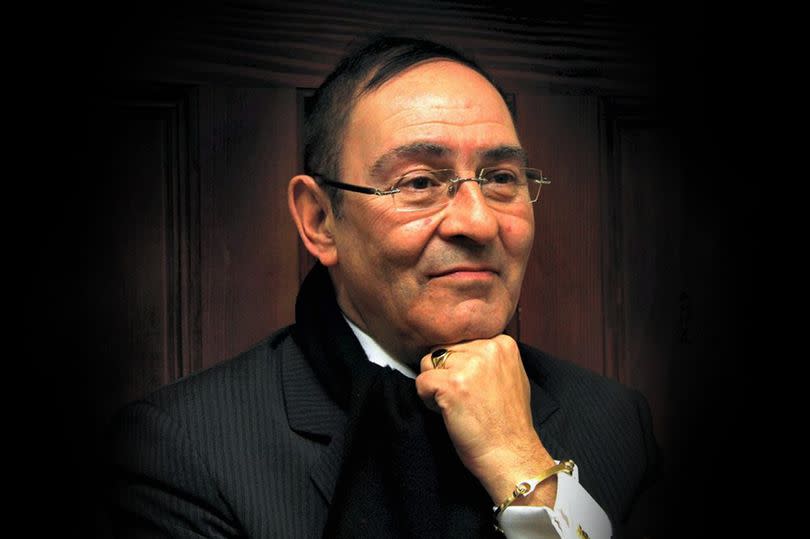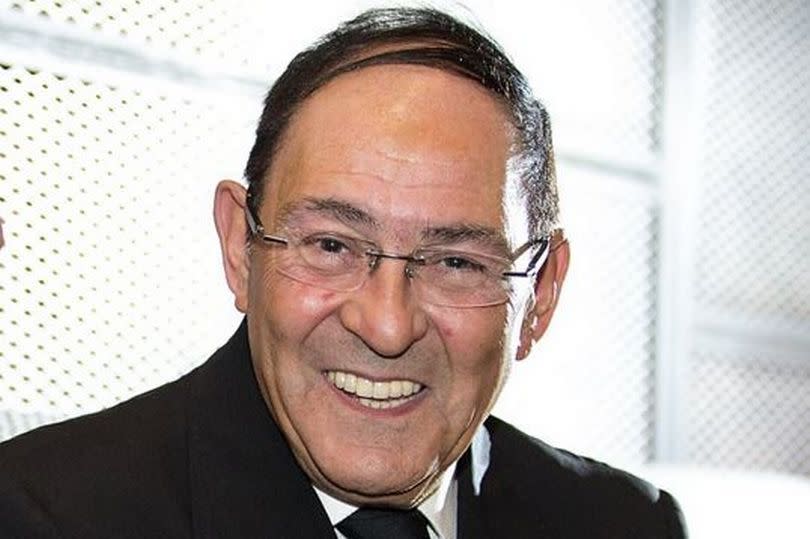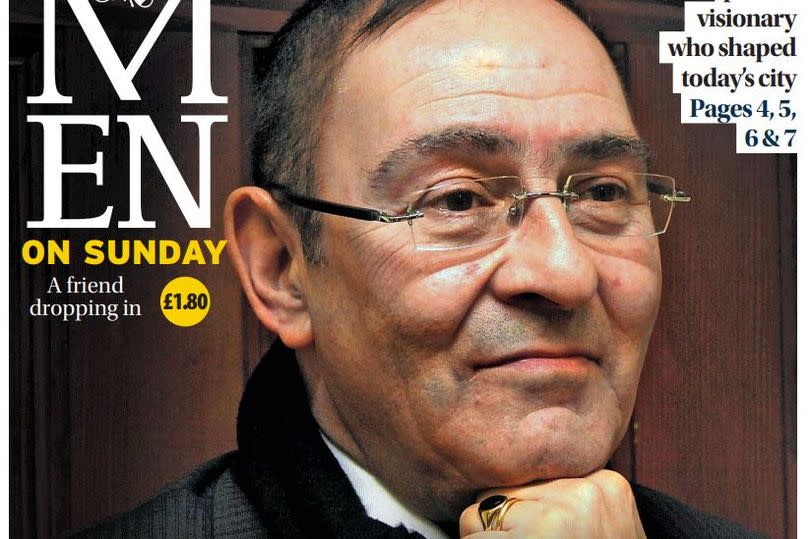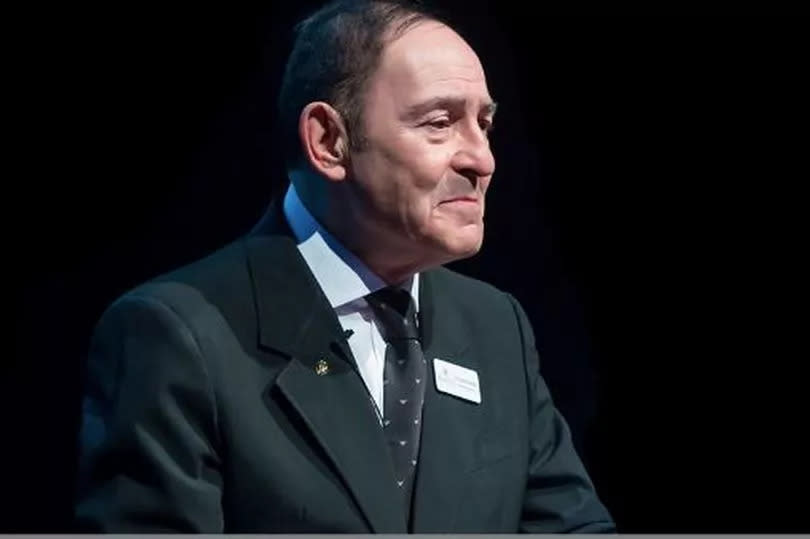Sir Howard Bernstein: The visionary who put the swagger back into Manchester

His sartorial style was atypical of the staid local government corridors of power. His immaculate wardrobe included ever-present scarves, vivid socks, Armani suits and sovereign rings.
The 'armour' was part of his personality. It reflected the success he had achieved, always putting his beloved city of Manchester and the wider region at the heart of each and every grand plan.
Everything he did, he did for his city. He was a man who got things done, a master dealmaker.
READ MORE: Sir Howard Bernstein - the man who changed the face of Manchester
Sir Howard Bernstein, the former chief executive of Manchester council, who has died aged 71, was a fixer-in-chief whose visions reshaped Manchester. He talked big - and delivered.
He was the one of a trio of key players whose influence propelled a once tired looking city onto the international stage. Together with Labour council leaders Graham Stringer and Sir Richard Leese, Sir Howard brokered deals others could only dream of.
Reversing decades of decline, he oversaw the city's remarkable transformation from the post-industrial doldrums of the 1980s to the modern city of today. He inspired other cities to take their futures into their own hands.

He knew that to grow and prosper, Manchester had to work closely with the private sector and politicians, whatever their allegiances. It earned him as much respect in Whitehall as he had in the north. Sir Howard, knighted in 2003, stepped down in 2016, 45 years after joining the town hall staff as an 18-year-old junior whose first task was to wash teacups.
He went on to hold advisory roles at Deloitte, the University of Manchester and Manchester City's parent company City Football Group, among others. He was also named an honorary president at City and president at Lancashire Cricket Club.
Sir Howard's incredible legacy includes the regeneration of Hulme - one of the most 'important experiences' of his life - bringing the Commonwealth Games to the city; the success of Manchester Airport; the rebuild after the 1996 IRA bomb; the Metrolink network; the Bridgewater Hall; and devolution.
READ MORE: Sir Howard Bernstein, Manchester legend, dies
READ MORE: Sir Howard Bernstein latest tributes as Manchester remembers a true hero
'Manchester has lost one of its finest'
Howard's brother Russell told the Manchester Evening News: "Howard touched so many people's lives during his remarkable career, but it is as my big brother that I will remember him. Whilst we had many differences, particularly regarding our football and politics, that only contributed to the many things that we both shared together.
"I am a proud brother of the enormous legacy Howard leaves across Greater Manchester. It's not an exaggeration to say Manchester has lost one of its finest."
Sir Howard was chief executive from 1998 to 2016. His guile and relentless drive played a crucial part in putting the swagger back into the city.
When he departed from a stellar career in local government, he declared with typical chutzpah that his was a 'Premier League World City'. The football metaphor was apt as he was a devoted Manchester City supporter.
He, without doubt, was instrumental in bringing foreign investment to help shape the city we now have. In 1986, when only 33, Sir Howard engineered the takeover of Manchester Airport by Greater Manchester's 10 councils.
His pact and mutual understanding of inner-city blight with Conservative Minister Michael Heseltine resulted in one of his proudest achievements - the early 1990s rebuilding of Hulme, once a by-word for local authority housing failure with its famously flawed Crescents.

Through Sir Howard's pragmatism, dealing with a Tory Minister, they were replaced by red-bricked houses with gardens and low-rise flats on well laid-out roads. He also convinced Asda to open a supermarket there.
In June, 1996 the IRA bombed Manchester city centre, leaving a van loaded with explosives next to Marks and Spencer on Corporation Street. Sir Howard tied together a myriad of property deals to deliver the rebuild. He would later describe it as his 'biggest intellectual challenge'.
He played a key role in securing the 2002 Commonwealth Games for Manchester, having previously been involved in the dry-run of the city's ill-fated bid to get the Olympics. The legacy of the games and the new stadium would provide a new home for Manchester City, with the club moving from Maine Road, which in turn, assisted by Sir Howard's vision, resulted in the regeneration of east Manchester with an Abu Dhabi-based takeover and cash.
Being the chief civil servant at a Labour dominated town hall meant he had to use his nous to show his political counterparts the cash and progress that could be achieved by working with perceived 'enemies'.
His deep-seated love of the city which presented his Jewish Russian-immigrant grandparents with an opportunity to improve their lot - and his ability for sustained coaxing and a willingness to adapt - ultimately changed the face of Manchester.
An upbringing that shaped a city
Sir Howard was born into a Jewish family in Cheetham Hill in 1953, the older of two brothers. His dad Maurice, whose parents had emigrated from Russia in the 1900s, sold raincoats on Cheetham Hill Road above the laundrette opposite the library.
A Jewish upbringing - at a time when the war was still fresh in the collective memory - would come to shape his outlook, one which in turn would come to shape his home city. He told the M.E.N. in 2016: "My father was always very... not political, but very socially aware. I think most Jewish families were in that era, from where they came from, and where their parents came from.
"Being in a community was fundamental. Treating people with respect, working across the community - that always was seen as being very, very important."
After joining the town hall as a junior clerk on a £500-a-year salary, Sir Howard lasted three months as a glorified tea-boy, before being moved to the legal department. He became a junior there, serving a range of lawyers. "I always remember the assistant chief executive," he later recalled. "I had to come in and make his tea in the morning. I got so fed up with him I decided I wasn't going to make his tea.”
From there, Sir Howard moved into conveyancing. He said: "[It was] one of the most boring jobs I have ever done in my life. They gave me work, which I managed to do in about half an hour. They all thought it was incredibly complicated, but it wasn't."
Bravado – and impatience – fuelled his rise up the ranks. By the time Graham Stringer came to lead the council in 1984, Sir Howard was a junior officer. Stringer remembers being impressed by his energy in fighting Stansted Airport over unfair competition.
The pair, Sir Howard said, became 'soul mates' in the years that followed. Manchester was about to reinvent itself.
"Manchester, during the 1980s, was a very different place," Sir Howard later said.. "We'd just lost our way. We didn't really have an economic policy. We certainly didn't work with the government. Then Graham came in and I think revolutionised - over time - the thinking."
Stringer has no doubt about Sir Howard's contribution to the city. "Howard was a unique local government officer," he told the M.E.N. Many local government officers can write good reports.
"Howard wrote beautifully and precisely, but more importantly - to use a football analogy - he put the ball in the net. Rather than just talking about it, he delivered major schemes and huge amounts of inward investment.
"Manchester would be a different city, if Howard at the age of 18 had not decided to leave school and become an official of Manchester City Council. He was passionately committed both to the city of Manchester and Manchester City Football Club.

"He would work tirelessly on behalf of both of those organisations. I think he was motivated by a fierce loyalty and the most optimistic outlook on life I think I have ever come across. He always thought he could achieve the dreams he had for Manchester. He dreamt, when City were in the doldrums, that one day they would win things and both dreams - for the city and his club - he helped make come true."
Ex-Chancellor George Osborne once dubbed Sir Howard 'one of the very, very best public servants [he had] ever come across', having been persuaded to hand Greater Manchester a devolution deal in 2014 - the first outside London.
'An insatiable appetite for work'
Sir Howard's achievements were many, but Stringer highlights the Commonwealth Games. "They showcased to the world and convinced politicians of all parties that the way Manchester did things meant we were worthy of both private and public investment," he added.
"When I first met Howard, formally, when I became leader of the council 40-years-ago, he was preparing papers making representations to an inquiry into the expansion of Stansted Airport, which we were opposing because it would have created unfair competition for Manchester because of the public money going into it.

"It is a measure of Howard's achievements how he started with that and we [the 10 Greater Manchester councils] ended up buying Manchester Airport. If you wanted a symbol of both Howard's influence and the progress of the city, that would stand as a mark of both.
"Howard had amazing optimism and an insatiable appetite for work. I could phone him and say 'there is a statement in the Commons tomorrow at 11.30am' and he'd say 'I'll have you a briefing faxed over by 8am'. And it would be precise and very helpful."
Of the legacy left by his work, Stringer said: "Well, a completely different city. If you walk into the city centre now and you compare it to when Howard started work in 1971, it is unrecognisable. When he started, we still had a steel industry and chemical industry and engineering and Howard was part of making sure we didn't end up looking like Detroit.
"My favourite anecdote about Howard is from we were in the Press Club, me and other United supporters after City got thumped 5-0 by United. We knew Howard was coming for a pint with us after the match and we decided to go easy on him as it's not much fun when your team get hammered like that. He came in and the first thing he said was 'United have got real problems'."
Former Manchester council leader Sir Richard Leese said: "Howard was a friend and valued colleague for more than 30 years and I'm devastated he has died. The last time I saw him, a couple of weeks ago, he was still enthusing about the next stages of regeneration in east Manchester, around Ancoats and the Etihad Stadium.
"Manchester is blessed to have had one of the great local government chief executives, someone whose drive, vision and energy was devoted to the city he loved. His impact on Manchester is unrivalled. He is a loss for Manchester and Greater Manchester, but even more so for his family - and my thoughts are with them at this sad time."
Sir Howard helped restore the self-belief of the former 'Cottonopolis'. As the man himself said: "I worried in my early career that I had to demonstrate I was a genius every time I opened my mouth, until a mentor held me back from a meeting and said 'just a little bit of mediocrity, occasionally, would do."
He was able to negotiate with friends and foes alike. "If you are going to be a good leader in any field, you've got to be able to engage, inspire, persuade," he recalled. He had ample abilities in all three areas - and Mancunians were the beneficiaries.
Sir Howard, who lives in Prestwich, leaves behind wife, Vanessa, two children and three step-children.

 Yahoo News
Yahoo News 
